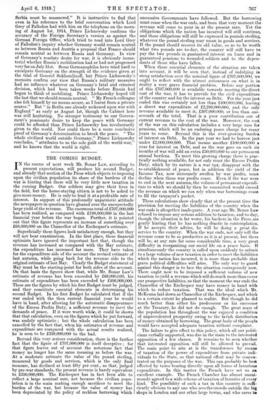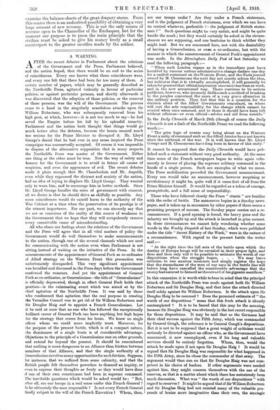THE COMING BUDGET.
IN the course of next week Mr. Boner Law, according to present expectations, will produce his second Budget, and already that section of the Press which objects to imposing upon the civilian population its share of the burdens of the war is hinting that there will be very little new taxation in the coming Budget. Our soldiers may give their lives in the field, but the home-staying citizen is not to be asked to give more money. He is only to lend it at a profitable rate of interest. In support of this profoundly unpatriotic attitude the newspapers in question have gloated over the unexpectedly large yield of the revenue. The enormous total of £707,000,000 has been realized, as compared with £198,000,000 in the last financial year before the war began. Further, it is pointed out that this figure represents an increase of something over 168,000,000 on the Chancellor of the Exchequer's estimate.
Superficially these figures look satisfactory enough, but they will not bear examination. In the first place, these financial optimists have ignored the important fact that, though the revenue has increased as compared with the May estimate, the expenditure has increased far more. They have taken for the expenditure side of the account the revised estimate of last autumn, while going back for the revenue side to the original estimate of last May. Clearly the Budget statement of May must be the starting-point for both sides of the account. On that basis the figures show that, while Mr. Bonar Law's estimate of revenue has been exceeded by £68,000,000, his estimate of expenditure has been exceeded by £406,000,000. These are the figures by which his first Budget must be judged, and they constitute essential elements in determining his second Budget. In his first Budget he calculated that if the war ended with the then current financial year he would have in hand, after allowing for the automatic disappearance of the Excess Profits Duty, a sufficient revenue to meet the demands of peace. If it were worth while, it could be shown that that calculation, even on the figures which he put forward, was unduly optimistic • but the whole calculation has been cancelled by the fact that, when his estimates of revenue and expenditure are compared with the actual results realized, he is seen to be £338,000,000 to the bad.
Beyond this very serious consideration, there is the further fact that the figure of £707,000,000 is itself deceptive ; for that figure leaves out of account the notorious fact that money no longer has the same meaning as before the war. At a moderate estimate the value of the pound sterling, measured by goods and services, which is the only final Measure, has declined at least fifty per cent., so that, judged by pm-war standards, the present revenue is barely equivalent to £350,000,000. The Exchequer has in fact been able to collect a large nominal sum, not because the civilian popu- lation is in the main making enough sacrifices to meet the burden of the war, but because the value of money has been depreciated by the policy of reckless borrowing which successive Governments have followed. But the borrowing must cease when the war ends, and from that very moment the revenue will cease to pour in at the present rate. Yet the obligations which the nation has incurred will still continue, and those obligations will still be expressed in pounds sterling, whatever the pound sterling may mean in goods and services. If the pound should recover its old value, so as to be worth what two pounds are to-day, the country will still have to pay the two pounds in guaranteed interest on loans and in guaranteed pensions to wounded soldiers and to the depen- dants of those who have fallen.
When these essential elements of the situation are taken into account, it will be seen that, instead of indulging in smug satisfaction over the nominal figure of £707,000,000, we ought to reflect with the utmost seriousness on what is in reality a very grave financial problem. Before any portion of this £707,000,000 is available towards meeting the direct cost of the war, it has to provide for the civil expenditure of the country and for the interest on Debt. For the year just ended this was certainly not less than £400,000,000, leaving a direct war expenditure of £2,296,000,000, and the only revenue available to meet it, E307,000,000, or less than one- seventh of the total. That is a poor contribution out of current revenue to the cost of the war. Moreover, the cost of the war on this calculation includes a very large sum for pensions, which will be an enduring peace charge for many years to come. Beyond this is the ever-growing burden of interest on Debt. In the past year we had to borrow just under £2,000,000,000. That means another £100,000,000 a year for interest on Debt, and as the war goes on each six months of war will add an extra £50,000,000 to our permanent annual burdens. To meet this growing charge there is prac- tically nothing available, for not only must the Excess Profits Duty, which by its nature is a war tax, disappear with the re-establishment of peace, but in addition the yield of the Income Tax, now immensely swollen by war profits, must decline when those war profits cease. Even if the war were to end in the next autumn, the volume of permanent expendi- ture to which we should by then be committed would exceed the revenue on which we can rely when war borrowings cease to fill the taxpayer's pocket.
These calculations show clearly that at the present time the provision for meeting the liabilities of the country when the war ends is altogether inadequate. A year ago Mr. Boner Law refused to impose any serious addition to taxation, and to-day, though the situation is far worse, his backers in the Press are gently hinting that he has nothing drastic in contemplation. If he accepts their advice, he will be doing a great dis- service to the country. When the war ends, not only will the revenue cease to be so productive as it is at present, but there will be, at any rate for some considerable time, a very great difficulty in reorganizing our social life on a peace basis. If simultaneously the country is called upon suddenly to submit to a large volume of new taxation in order to meet the liabilities which the nation has incurred, it is more than probable that grave political difficulties will arise. The only way to guard against this danger is to face the situation courageously now. There ought now to be imposed a sufficient volume of new taxation to yield a revenue which will do much more than cover our prospective liabilities, so that the moment the war ends the Chancellor of the Exchequer may have money in hand with which to reduce taxation. That was the ideal which Mr. McKenna laid down as Chancellor of the Exchequer, and which to a certain extent he planned to realize. But though he did much better than either his predecessor or his successor at the Treasury, he did not do enough. The great mass of the population has throughout the war enjoyed a condition of unprecedented prosperity owing to the lavish distribution of money obtained by borrowing. The great body of the people would have accepted adequate taxation without complaint.
The failure to give effect to this policy, which all our politi- cians verbally supported, was due in the main to the interested opposition of a few classes. It remains to be seen whether that interested opposition will still be allowed to prevail. The main point to aim at is the transference by means of taxation of the power of expenditure from private indi- viduals to the State, so that national effort may be concen- trated on the purposes of the war. This can probably be best effected by taxes bearing directly upon all forms of luxurious expenditure. In this matter the French have set us an excellent example. The French Chamber has almost unani- mously agreed to a wide scheme of taxation of luxuries of every kind. The possibility of such a tax in this country is suffi- ciently obvious to any one who sees the crowds outside the big shops in London and our other large towns, and who cares to examine the balance-sheets of the great drapery stores. From this source there is an undoubted possibility of obtaining a very large amount of new revenue. This is not the only source of revenue open to the Chancellor of the Exchequer, but for the moment our purpose is to press the main principle that the civilian must be asked to give his money freely as a small counterpart to the greater sacrifice made by the soldier.



























 Previous page
Previous page